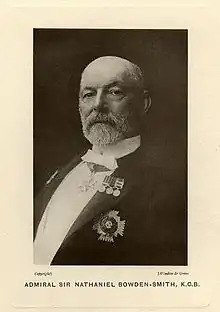Nathaniel Bowden-Smith
Admiral Sir Nathaniel Bowden-Smith KCB (21 January 1838 – 28 April 1921) was a Royal Navy officer who served as Commander-in-Chief, The Nore.
Sir Nathaniel Bowden-Smith | |
|---|---|
 | |
| Born | 21 January 1838 Brockenhurst, Hampshire, England |
| Died | 28 April 1921 (aged 83) London, England[1] |
| Allegiance | |
| Service/ | |
| Years of service | 1852–1903 |
| Rank | Admiral |
| Commands held | HMS Narcissus HMS Undaunted HMS Hercules HMS Amethyst HMS Britannia Australia Station Nore Command |
| Battles/wars | Second Anglo-Burmese War Crimean War Second Opium War |
| Awards | Knight Commander of the Order of the Bath |
Naval career
Bowden-Smith joined the Royal Navy in 1852.[2] He took part in the Second Anglo-Burmese War later that year and in the Crimean War in 1855.[3]
He was present at the Battle of Fatshan Creek in 1857 and at the attack on the Peiho Forts in 1858 during the Second Opium War.[4]
Promoted to captain in 1872 he commanded the frigates HMS Narcissus and HMS Undaunted, the battleship HMS Hercules and the corvette HMS Amethyst.[2] He went on to command the training ship HMS Britannia in 1883 and to be Commander-in-chief, Australia Station in 1892 and Commander-in-Chief, The Nore in 1899.[2] He retired in 1903.[2]
In 1905 commenting on the Battle of Port Arthur he said the "siege was distinguished by the most daring and persistent attacks [by the Japanese] and the most heroic defence [by the Russians] on record."[5]
Family
In 1873 he married Emily Cecilia Sandeman.[2]
Honours and awards
- 22 June 1897 - To celebrate the Diamond Jubilee of Queen Victoria Vice-Admiral Nathaniel Bowden-Smith is appointed a Knight Commander of the Order of the Bath.[6]
References
- Marylebone Registration District
- William Loney RN
- Dix Noonan Webb Medals
- Naval Commanders
- "The fall of Port Arthur (Part 1)". Archived from the original on 17 June 2005. Retrieved 13 February 2018.
{{cite web}}: CS1 maint: bot: original URL status unknown (link) The Age, 4 January 1905 - "No. 26947". The London Gazette. 14 March 1898. p. 1682.